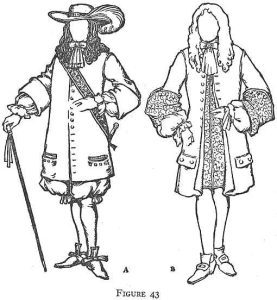This happy production of “Paddy,” must have been very popular with “the rebels,” as there were four different editions of it published as broadsides, a short time after its first appearance in the Pennsylvania Magazine. The version subjoined was printed in May, 1775, and differs slightly in language from that contained in the periodical.
The Epistle to the Troops in Boston
By my faith, but I think ye’re all makers of bulls,
With your brains in your breeches, your — in your skulls,
Get home with your muskets, and put up your swords,
And look in your books for the meaning of words.
You see now, my honies, how much your mistaken,
For Concord by discord1 can never be beaten.
How brave ye went out with your muskets all bright,
And thought to be-frighten the folks with the sight;
But when you got there how they powder’d your pums, And all the way home how they pepper’d your – ,
And is it not, honeys, a comical crack,
To be proud in the face, and be shot in the back.
How come ye to think, now, they did not know how,2
To be after their firelocks as smartly as you?
Why, you see now, my honies, ’tis nothing at all,
But to pull at the trigger, and pop goes the ball.
And what have you got now with all your designing,
But a town without victuals to sit down and dine in;
And to look on the ground like a parcel of noodles,
And sing, how the Yankees have beaten the Doodles. I’m sure if you’re wise you’ll make peace for a dinner, For fighting and fasting will soon make ye thinner.
- “For Concord by discord,” &c. Puns upon the word Concord were numberless, after the action of the nineteenth of April, 1775. The following appeared as “an anecdote,” shortly after that action. “When the emigrants and adventurers first came to America, they met on the shore with Calvinists, Huguenots, Papists and Protestants. Such a medley of people, of different tenets and persuasions, promised much discord; however, good sense prevailed, and they unanimously agreed that no difference in opinion should disturb the public tranquillity, but that they would live in all brotherly love with each other, and they named the first founded spot, and town, Concord. Is it not whimsical, that upon this spot they should first draw blood, and gallantly contend for the rights and liberties of America?
- “They did not know how.” The following brief account of the affairs at Lexington and Concord is taken from a letter dated Boston April 19, 1775. “Last night, at about eleven o’clook, one thousand of the best troops, in a very secret manner, rowed up the Cambridge River, and landed. From whence they marched to Lexington where they saw a number of men exercising. They ordered them to disperse, and immediately fired on them; killed eight men on the spot, and then marched to Concord. This alarmed the country so, that it seemed as if men came down from the clouds. This news coming to town, General Gage sent out another thousand men, with a large train of artillery. In the mean time, those troops at Concord had set fire to the court-house. There an engagement ensued and the King’s troops retreated very fast, until they were reinforced with the troops the General had sent: but they did not stand Iong before the whole body gave way; retreating, and our men keeping up at their heels, loading and firing, until they got to Charlestown when our people thought it not prudent to come any further, fearing the ships in the harbor would be ordered to fire on Boston and Charlestown. Our men behaved gallantly.” One poor fellow, who had received a wound in his breast, in following up the retreat, was offered assistance by a brother soldier, when he remarked, “I am beyond your assistance – pursue the enemy !” – and with their words on his lips, fell back and died. – Virginia Gazette.

